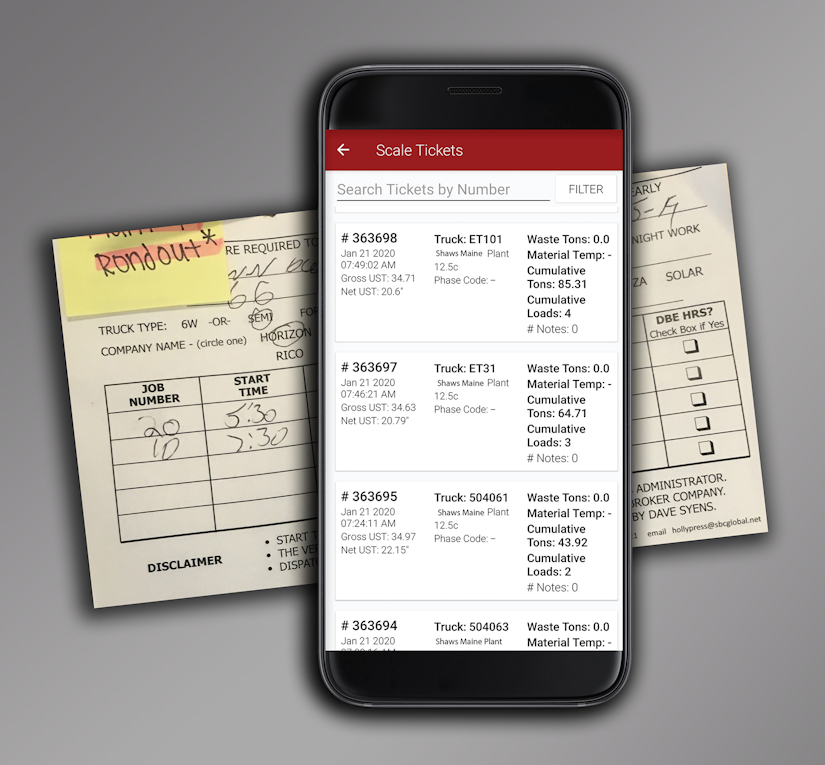
Earthwave’s FleetWatcher provides e-ticketing between material producers, contractors and DOTs. It is among the services e-ticketing companies are offering at no cost during the pandemic.
State transportation departments around the country have experimented with paperless material delivery systems on road projects for several years, but in most cases, they still required paper tickets exchanged between material producers, haulers and contractors.
The coronavirus is changing that.
Now, some DOTs are throwing out the paper requirement. Others have gone so far as to refuse paper tickets altogether to prevent the virus’ spread.
That, along with their own desires to contain COVID-19, has sent contractors and material producers scrambling to go digital. In response, e-ticketing companies are offering free services and discounts during the pandemic and seeing a big increase in demand for their products.
“It was increasing before this,” says Larry Baker, CEO of Earthwave, which developed FleetWatcher truck-tracking and e-ticketing system. “… We were growing at a pretty significant trajectory already, and this just took it to an unpredicted, unprecedented level.”
Baker said the company was integrating three to five material plants per week before the virus and is now integrating three to five per day. It’s also providing webinars to help its customers. Those fill up rapidly, and the company plans to add more, he says.
At the same time, he’s hearing from some contractors and producers that are having to lay off workers and renegotiate bills. So the company decided to offer its e-ticketing app as a free service for the rest of the year.
“It’s an incentive to help in any way we can and not have somebody worrying about what the cost is,” he said.
Other e-ticketing companies are doing the same.
“The heavy construction community needs digital capabilities across their supply chains now more than ever,” says Phil Ramsey, CEO at Command Alkon, which is also offering free e-ticketing until the end of 2020.
DOTs rejecting paper
The Alabama Department of Transportation is among the DOTs instituting paperless material-delivery tickets because of the virus. It has been piloting e-ticketing projects over the years, says State Construction Engineer Skip Powe.
“With the COVID-19 pandemic, we discontinued the practice of accepting paper tickets when materials are delivered to the site, and requested our contractors and suppliers to accelerate their implementation of e-ticketing,” Powe said in an email. “Some contractors were already using e-ticketing, and others were rapidly looking for the right system to meet their needs.”
In an April 8 memo to its district engineers, the Florida Department of Transportation set out guidelines for “contactless ticketing.”
“To ensure social distancing and to prevent the transmission of COVID-19 via physical contact, paper delivery tickets for construction materials may no longer by exchanged by hand at the project site,” the FDOT memo says. The FDOT is allowing its inspectors to receive direct electronic delivery tickets from the plant and e-ticketing for asphalt deliveries, among other methods that prevent human-to-human contact with paper.
The Kentucky Transportation Cabinet is also no longer accepting paper tickets and is accepting e-tickets.
The Indiana DOT has halted its requirement for paper delivery tickets during the pandemic and is allowing contractors to use e-ticketing systems instead of paper tickets “once the system is approved and inspectors are trained.” Mississippi’s DOT has implemented a similar policy.
Several other state DOTs say they are working to establish e-ticketing policies.
Before the virus, the impetus for many of the DOTs’ decision to try e-ticketing was efficiency. But COVID-19 has added a whole new safety factor to the mix.
“We have producers that want to eliminate all tickets out of their scale,” Baker says. “In this world right now, they want to get rid of that risk and safety exposure of handing that ticket out.”
He believes e-ticketing will continue to expand, with more DOTs accepting the practice because of the virus. There will be some glitches, especially for older material plants, some of which don’t even have internet access. “There will have to be exceptions to some for a while,” Baker says. “But at some point, you’ll have to upgrade that or you’re not paving for the state.”
As for full, nationwide implementation of e-ticketing by DOTs, Baker believes that will take another year or two.
“I don’t think there will be 100 percent adoption until 2021 or 2022,” he says.
